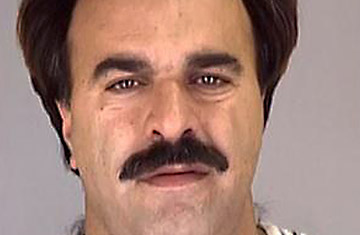
Manssor Arbabsiar, an Iranian-American used-car salesman, is accused of conspiring with Iran to assassinate the Saudi ambassador to the U.S.
Two seemingly unrelated events unfolded last week. On Tuesday in Washington, U.S. Attorney General Eric Holder announced the stunning disruption of an alleged plot by a former used-car salesman from Texas and members of Iran's Quds Force to assassinate the Saudi ambassador to the U.S. using the hired muscle of Mexican drug traffickers. Then on Wednesday, a House subcommittee held a hearing on "Narcoterrorism and the Long Reach of U.S. Law Enforcement." By all accounts these were separate phenomena. Yet both center on the same question: Is narcoterrorism the latest, greatest threat to U.S. national security? Or are we moving toward a redefinition of huge tracts of criminality as terrorism?
The U.S. Justice Department representatives insist the alignment of the hearing and the announcement of the arrest were completely fortuitous. But, on Wednesday, the hearing before the House Subcommittee on Terrorism, Nonproliferation and Trade, originally slated to discuss Afghanistan, Mexico and Colombia (countries at the front lines of the drug war), was dominated by Iran. Vanda Felbab-Brown, a Brookings Institution fellow who testified, said, "The Republican side of the committee, in particular, [was] very focused on Iran's activities in Latin America and very concerned about it, and doesn't think the U.S. is taking a tough enough position on that."
Indeed, apart from being bizarre, the alleged Iranian-Mexican conspiracy to detonate explosives in Washington managed to expand the definition of narcoterrorism, conflating it with another strain of radical politics. The term dates back to the Pablo Escobar era of Colombia, but it has recently found new currency in American politics on the campaign trail among Republican candidates. Originally, it described the bombings and targeted killings employed by the Medellín cartel against the Colombian government in the late 1980s. As invoked by Michele Bachmann and Rick Perry in debates and stump speeches, the term refers to the violence from cartels along the U.S. border as the of-the-moment national-security threat. That is in addition to the post-9/11 definition, which posited that terrorist groups like the Taliban and al-Qaeda were bankrolling their operations with profits generated from partnerships with drug-trafficking organizations. Now the allegations against the Iranian-American used-car salesman Manssor Arbabsiar and five supposed co-conspirators have trammeled another American bête noire into the mix.
Felbab-Brown worries that the debate on narcoterrorism may suffer in a rush to draw evidence from the Arbabsiar allegations. "I think it will be fodder for the very simplistic argument that terrorists and criminals should no longer be considered separate, that they all should be considered part of this monolithic, homogenous mess," she told TIME.
Before the hearing began, subcommittee chairman Ed Royce of California and Congressman Ted Poe, a Texas Republican and a subcommittee member, cited the case as evidence of the need to secure the U.S. border from the cartel threat. By the time the hearings got going, the subject had expanded from border security to U.S.-Saudi relations and sanctions on Iran. Poe applauded the Arbabsiar arrest and called for the U.S. government to "verbally support the Iranian freedom fighters in their efforts to change the regime in Iran."
The U.S. attorney prosecuting the case made it clear that politics played no role in announcing the indictment. "The timing of [Tuesday's] charging decision was based, as in every case, exclusively on operational and law-enforcement considerations," said Ellen Davis, spokesperson for the U.S. Attorney's office for the Southern District of New York. Arbabsiar, who is accused of conspiring to murder a foreign official and several counts related to the murder-for-hire scheme, was held for 14 days before being brought before a judge and the charges were announced. During that time, according to a letter prosecutors wrote to the judges supervising the case, the Iranian American provided "extremely valuable intelligence." "Federal law-enforcement agencies are vigorously and expeditiously pursuing leads relating to the defendant's statements, the results of various criminal search warrants, and other information obtained in this investigation," federal prosecutors wrote in a letter dated Oct. 6.
